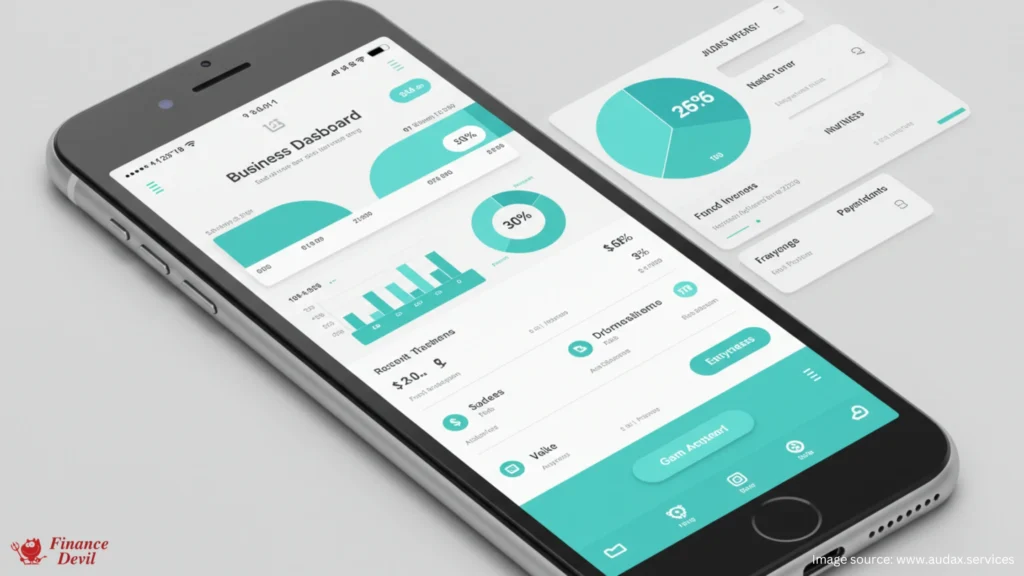Introduction

Small business owners in the United States face a critical decision when managing their company’s cash reserves: where to park excess funds to maximize returns while maintaining accessibility. With inflation continuing to impact the economy and interest rates remaining elevated, comparing money market and savings accounts for small businesses has become more crucial than ever.
The choice between these two financial products can significantly impact your business’s bottom line. While both accounts offer FDIC insurance protection and the ability to earn interest on deposits, they differ substantially in features, accessibility, and earning potential. Understanding these differences is essential for making an informed decision that aligns with your business’s financial goals and operational needs.
This comprehensive guide examines the nuances of business money market accounts versus traditional business savings accounts, providing you with the insights needed to optimize your company’s cash management strategy. We’ll explore real-world scenarios, analyze current market trends, and offer practical advice to help you maximize your business savings in today’s competitive banking landscape.
Understanding Business Money Market Accounts
What Makes Money Market Accounts Different
Business money market accounts represent a hybrid financial product that combines features of both checking and savings accounts. Unlike traditional savings accounts, these specialized accounts typically offer check-writing privileges and debit card access, making them ideal for businesses that need occasional access to their funds while still earning competitive interest rates.
The fundamental structure of money market accounts allows financial institutions to invest deposited funds in short-term, low-risk securities, which enables them to offer higher yields compared to standard savings accounts. This investment approach, however, comes with certain restrictions on the number of transactions businesses can make each month.
Key Features of Business Money Market Accounts
Enhanced Liquidity Options: Most business money market accounts provide multiple access methods, including check-writing capabilities, debit cards, and online banking features. This flexibility makes them particularly attractive for businesses that need to occasionally pay vendors or handle unexpected expenses directly from their savings.
Tiered Interest Rate Structure: Many money market accounts employ a tiered pricing model where higher balances earn progressively better interest rates. For example, balances under $10,000 might earn 1.5% APY, while balances above $100,000 could earn 3.5% APY or higher.
FDIC Insurance Protection: Like all deposit accounts at FDIC-insured institutions, business money market accounts are protected up to $250,000 per depositor, per bank. This insurance provides peace of mind for business owners concerned about the safety of their funds.
Traditional Business Savings Accounts Explained
The Foundation of Business Banking
Traditional business savings accounts serve as the cornerstone of small business financial management. These accounts prioritize security and steady growth over accessibility, making them ideal for long-term savings goals and emergency fund accumulation.
Core Characteristics
Simplified Structure: Business savings accounts typically offer straightforward terms with fixed interest rates that don’t vary based on balance tiers. This simplicity makes them easier to understand and manage for business owners who prefer uncomplicated banking relationships.
Limited Transaction Features: Most traditional business savings accounts don’t include check-writing privileges or debit card access. Instead, they focus on accumulating funds through deposits and earning interest over time.
Lower Minimum Balance Requirements: Generally, business savings accounts require lower minimum balances to open and maintain compared to money market accounts, making them more accessible for newer or smaller businesses.
Side-by-Side Comparison: Money Market vs. Savings Accounts
Interest Rate Analysis
When comparing money market and savings accounts for small businesses, interest rates represent the most significant differentiator. Current market data shows business money market accounts typically offer rates ranging from 2.75% to 4.42% APY, while traditional business savings accounts generally provide rates between 0.50% and 2.50% APY.
Money Market Account Advantages:
- Higher potential yields, especially for larger balances
- Tiered rate structures that reward higher deposits
- Variable rates that can increase with market conditions
Savings Account Benefits:
- More predictable rate structures
- Often no balance requirements for advertised rates
- Simpler rate calculations
Accessibility and Transaction Limits
The Federal Reserve’s 2020 decision to remove Regulation D restrictions gave banks flexibility in setting transaction limits, but many institutions still maintain certain limitations.
Money Market Account Access:
- Check-writing capabilities (usually limited to 6-10 per month)
- Debit card access for ATM withdrawals and purchases
- Online and mobile banking features
- Wire transfer capabilities
Savings Account Limitations:
- Typically no check-writing privileges
- Limited to electronic transfers and withdrawals
- May restrict the number of monthly transactions
- Focus on deposit accumulation rather than spending
Fee Structures and Requirements
Understanding fee structures is crucial when comparing money market and savings accounts for small businesses, as these costs can significantly impact your overall returns.
Common Money Market Account Fees:
- Monthly maintenance fees: $5-$15 (often waived with minimum balances)
- Excess transaction fees: $3-$15 per occurrence
- Minimum balance penalties: $10-$25 monthly
- Wire transfer fees: $15-$30 per transaction
Typical Savings Account Fees:
- Monthly maintenance fees: $0-$10 (frequently waived)
- Minimum balance fees: $5-$15 monthly
- Excess withdrawal fees: $5-$10 per occurrence
- Statement fees: $2-$5 monthly (often waived with electronic statements)
Current Market Leaders and Rate Analysis
Top-Performing Business Money Market Accounts
Based on current market analysis, several financial institutions stand out for their competitive business money market offerings:
First Internet Bank leads the market with rates up to 4.42% APY for balances exceeding $5 million, while offering 3.46% APY for smaller balances. Their account requires a $100 minimum opening deposit and charges a $5 monthly fee, waived with a $4,000 average daily balance.
NBKC Bank offers a streamlined approach with 2.75% APY regardless of balance size, no monthly fees, and no transaction limits. This makes it particularly attractive for businesses seeking simplicity and consistent returns.
U.S. Bank’s Platinum Business Money Market Account provides promotional rates up to 3.56% APY, making it competitive for businesses already maintaining relationships with traditional brick-and-mortar institutions.
High-Yield Business Savings Account Leaders
Traditional business savings accounts have also evolved to offer more competitive rates in response to market pressures. Online banks typically lead this space with rates often exceeding those offered by traditional brick-and-mortar institutions.
The national average for business savings accounts currently sits at approximately 0.54% APY, but top performers offer rates between 2.00% and 3.50% APY, particularly for online-only institutions with lower overhead costs.
Strategic Considerations for Small Business Owners
Cash Flow Management
When comparing money market and savings accounts for small businesses, consider your company’s cash flow patterns. Businesses with predictable income streams and minimal emergency fund needs might benefit more from money market accounts, while companies with irregular cash flow might prefer the security and simplicity of traditional savings accounts.
Business Size and Balance Requirements
Smaller Businesses (Under $50,000 in savings): May find traditional savings accounts more suitable due to lower minimum balance requirements and simpler fee structures. The difference in earning potential between account types becomes less significant with smaller balances.
Medium to Large Businesses ($50,000 – $500,000 in savings): Often benefit most from money market accounts, as the higher interest rates can generate substantial additional income while maintaining necessary liquidity for operations.
Enterprise-Level Businesses (Over $500,000 in savings): Should consider multiple account strategies, potentially utilizing both account types for different purposes, and may benefit from institutional banking relationships that offer customized rate structures.
Industry-Specific Considerations
Different industries have varying cash management needs that influence the money market versus savings account decision:
Seasonal Businesses: May benefit from money market accounts’ flexibility during peak seasons and check-writing capabilities for vendor payments.
Service-Based Companies: Often prefer money market accounts for their transaction capabilities and higher yields on retained earnings.
Retail Businesses: Might choose savings accounts for long-term goals while maintaining separate checking accounts for daily operations.
Tax Implications and Regulatory Considerations
Interest Income Taxation
Both money market and savings account interest are subject to federal income tax as ordinary income. However, the higher yields typically offered by money market accounts can result in greater tax liabilities, which business owners should factor into their decision-making process.
Regulatory Compliance
All FDIC-insured business deposit accounts must comply with federal banking regulations, including:
- Bank Secrecy Act requirements for large transactions
- Beneficial ownership disclosure rules for business accounts
- State-specific banking regulations that may vary by location
Risk Assessment and Insurance Protection
FDIC Insurance Coverage
Both account types offer identical FDIC insurance protection of up to $250,000 per depositor, per insured bank. However, businesses with larger cash reserves should consider strategies to maximize this protection:
Account Titling Strategies:
- Separate accounts for different business entities
- Strategic distribution across multiple FDIC-insured institutions
- Understanding how business partnerships and LLCs affect coverage limits
Interest Rate Risk
Money market accounts typically offer variable rates that can fluctuate with market conditions, while some savings accounts may offer promotional fixed rates for specific periods. Understanding these differences helps business owners make informed decisions based on their risk tolerance and financial planning needs.
Technology and Digital Banking Features

Online Banking Capabilities
Modern business banking increasingly relies on digital platforms, and comparing money market and savings accounts for small businesses must include an evaluation of technological features:
Advanced Features to Consider:
- Mobile check deposit limits and processing times
- API integration for accounting software
- Real-time balance notifications and alerts
- Multi-user account access with permission controls
- Automated savings transfer capabilities
Integration with Business Operations
Money market accounts often provide superior integration with business operations through their transaction capabilities, while savings accounts focus on accumulation and may offer better integration with long-term financial planning tools.
Making the Right Choice: Decision Framework
Evaluation Criteria
When comparing money market and savings accounts for small businesses, use this systematic approach:
Step 1: Assess Your Liquidity Needs
- How often do you need access to savings?
- Do you prefer check-writing capabilities?
- What are your typical transaction patterns?
Step 2: Calculate Break-Even Points
- Compare potential earnings after fees
- Consider minimum balance requirements
- Evaluate the impact of transaction limits
Step 3: Consider Future Growth
- How will your business change over the next 2-3 years?
- Will your cash management needs evolve?
- What account features will become more important?
Common Decision Scenarios
Choose Money Market Accounts When:
- Your business maintains substantial cash reserves ($25,000+)
- You need occasional check-writing capabilities
- Interest maximization is a primary goal
- You can comfortably maintain the minimum balance requirements
Choose Savings Accounts When:
- Your business is in early stages with limited cash reserves
- You prefer simple, straightforward banking relationships
- Transaction capabilities are unnecessary
- You want to minimize fees and complexity
Future Trends and Market Outlook
Interest Rate Environment
The Federal Reserve’s monetary policy significantly impacts both money market and savings account rates. Current economic indicators suggest continued rate volatility, making flexible money market accounts potentially more attractive for businesses that can capitalize on rising rate environments.
Technological Evolution
Banking technology continues evolving, with artificial intelligence and machine learning increasingly influencing cash management recommendations. Future banking products may blur the lines between money market and savings accounts even further, offering more customized solutions based on individual business patterns.
Regulatory Changes
Potential regulatory modifications could affect transaction limits, fee structures, and insurance coverage. Staying informed about these changes is crucial for businesses making long-term banking decisions.
Conclusion
Comparing money market and savings accounts for small businesses reveals that the optimal choice depends heavily on your specific business circumstances, cash flow patterns, and financial goals. Money market accounts offer superior earning potential and transaction flexibility, making them ideal for businesses with substantial cash reserves and occasional liquidity needs. Traditional savings accounts provide simplicity and lower barriers to entry, serving businesses focused on straightforward accumulation strategies.
The current interest rate environment strongly favors businesses that can take advantage of higher-yielding money market accounts, particularly those offering rates above 3% APY. However, the additional features and requirements of these accounts aren’t suitable for every business situation.
Consider your business’s unique needs, evaluate the total cost of ownership including fees and minimum balance requirements, and choose the account type that best supports your company’s financial objectives. Remember that this decision isn’t permanent – as your business grows and evolves, your banking needs may change, and you can adjust your strategy accordingly.
Take Action Today: Review your current business banking setup and compare it against the options outlined in this guide. Calculate the potential additional earnings from switching to a higher-yield account, and consider consulting with your business accountant or financial advisor to ensure your choice aligns with your overall financial strategy. The difference between a well-chosen and poorly chosen business deposit account can amount to thousands of dollars annually – money that stays in your business rather than being left on the table.
Frequently Asked Questions
What’s the minimum balance requirement for business money market accounts?
Business money market account minimum balance requirements typically range from $1,000 to $25,000, depending on the financial institution. Online banks generally offer lower minimums compared to traditional brick-and-mortar banks. Some accounts, like NBKC Bank’s Business Money Market, require no minimum balance, while others, such as Grasshopper Bank’s Innovator Savings Account, require $25,000 to earn their highest interest rates.
Can I have both a business money market and savings account?
Yes, many businesses benefit from maintaining both types of accounts simultaneously. This strategy allows you to use a money market account for funds that need occasional access while keeping long-term savings in a traditional savings account. This approach can help you optimize interest earnings while maintaining appropriate liquidity for different business needs.
How do business money market account interest rates compare to personal accounts?
Business money market accounts often offer comparable or slightly higher interest rates than personal money market accounts, particularly for larger balances. However, business accounts typically come with higher minimum balance requirements and different fee structures. The exact comparison varies by institution and current market conditions.
Are there transaction limits on business money market accounts?
While the Federal Reserve removed mandatory Regulation D restrictions in 2020, many banks still impose transaction limits on business money market accounts. These typically range from 6-10 transactions per month, with fees for excess transactions. Some banks, like NBKC, offer unlimited transactions, while others maintain traditional limits.
What happens if my business money market account falls below the minimum balance?
Falling below the minimum balance requirement typically results in monthly maintenance fees, which can range from $5 to $25. Some banks may also reduce your interest rate or convert your account to a different product type. It’s important to understand these policies before opening an account and maintain adequate balances to avoid penalties.
Can I use a business money market account for payroll?
While business money market accounts can technically be used for payroll through their check-writing features, most businesses use dedicated business checking accounts for regular payroll processing. Money market accounts are better suited for savings and occasional large payments rather than regular operational expenses.
How does FDIC insurance work for business accounts?
FDIC insurance covers business accounts up to $250,000 per depositor, per insured bank. This coverage is separate from personal account coverage, meaning you could have both personal and business accounts at the same bank with full coverage on each. For businesses with larger cash reserves, strategies like using multiple banks or different account titling can help maximize insurance protection.
What documentation do I need to open a business money market account?
Opening a business money market account typically requires business formation documents (articles of incorporation, partnership agreement, or DBA filing), an Employer Identification Number (EIN), business licenses, and personal identification for account signers. Some banks may also require beneficial ownership information and business financial statements.





